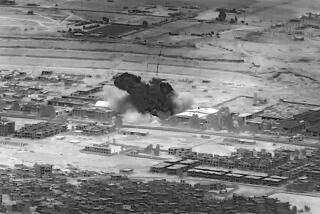Bombs Kill 2 U.S. Troops in Iraq
- Share via
BAGHDAD — U.S. artillery pounded suspected guerrilla positions in southern Baghdad on Friday for the fourth consecutive night, and two American soldiers were killed in enemy attacks, the military said.
Friday’s deaths brought to eight the number of troops killed since Wednesday in what U.S. officials feared would be a Christmas offensive by insurgents determined to show they are still fighting despite the capture of former Iraqi President Saddam Hussein.
A soldier from the Army’s 4th Infantry Division was killed Friday when his convoy hit a roadside bomb near Baqubah, 25 miles northeast of Baghdad. In the same area, another soldier was killed when a similar explosive device that he was trying to defuse detonated, military officials said.
Roadside bombs, often concealed in trash, discarded automobile parts or dead animals, have become the crude but lethal weapon of choice for Iraqi guerrillas battling the U.S.-led occupation. The deaths bring the number of U.S. soldiers reported killed since the war began March 20 to at least 465.
Baqubah is a Sunni Muslim-dominated hotbed of insurgent activity, part of the central region that was Hussein’s power base. Two soldiers were killed Thursday, Christmas Day, when their camp in Baqubah was shelled.
Three soldiers from the 101st Airborne Division were wounded Friday when their convoy came under small-arms fire in the northern city of Mosul.
Also in Mosul, a prominent Iraqi journalist and former member of Hussein’s outlawed Baath Party was shot to death as he left a mosque after Friday prayers. Talal Khalidi was killed with his son Saad in what appears to be a continuation of politically motivated murders aimed at settling old grievances or exacting revenge. Scores of former Baathists and their Shiite Muslim rivals have been killed since the collapse of the regime.
In Baghdad, military spokesmen said they were pressing ahead with their so-called Iron Fist operation, aimed at hunting and killing or capturing insurgents.
Large explosions reverberated through the capital well before dusk Friday and into the night as U.S. gunships fired cannons and other artillery at suspected insurgent targets. Most of the blasts on previous days, however, caused little damage and seemed to be a show of force. For example, most of the targets Wednesday night were empty fields that the U.S. military said had been used as firing positions by guerrillas armed with rocket launchers.
In the last 24 hours in Baghdad, the Army said, 21 “significant” associates of Hussein have been captured, including “known bomb makers,” insurgent cell leaders and senior planners. Troops have seized 60 122-millimeter rockets, bomb-making materials and, in the town of Ramadi, three surface-to-air missiles that presumably could be used to bring down helicopters or other aircraft.
In addition, troops from the 1st Armored Division captured five men they suspect of firing rockets into the central Baghdad headquarters of the U.S. occupation authority on Christmas night. The blasts caused no injuries or damage but jolted the vast compound and underscored its vulnerability.
Military aircraft spotted the launch point after the rockets were fired and reported the location to ground forces, said Capt. Jason Beck of the 1st Armored.
The Christmas attack on the Coalition Provisional Authority headquarters was among a string of grenade and mortar strikes on hotels used by foreign journalists and contractors, embassies and other targets. The barrage appeared to be largely symbolic, displaying the insurgents’ agility and ability more than their firepower.
Persistent bloodshed in Iraq has made it difficult for the Bush administration to lure allies into the fray. But Japan on Friday made good on a pledge to help, dispatching to Iraq a small team of air force officers before its planned deployment of 1,000 noncombat troops. This would be the nation’s largest such operation since World War II.
The Japanese constitution imposes strict rules on its armed forces’ involvement in conflicts, and the mission is meant to be purely humanitarian. To underscore the government’s assurance that its troops would not be placed in harm’s way, the officers departing Tokyo wore blazers and slacks instead of uniforms.
More to Read
Sign up for Essential California
The most important California stories and recommendations in your inbox every morning.
You may occasionally receive promotional content from the Los Angeles Times.









